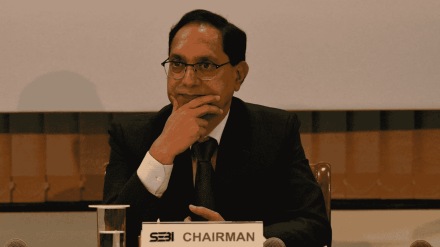The High-Level Committee (HLC), tasked with comprehensively reviewing the Securities and Exchange Board of India (Sebi)’s conflict of interest norms for its board members and executives and suggesting new norms, may submit its report within this month, Sebi Chairman Tuhin Kanta Pandey told FE.
“Whatever I know, the Committee will give its support very soon. It could be next week or so, certainly within this month,” he said.
Why the high-level review was initiated
The market regulator approved formation of a high-level committee in the first board meeting under chairperson Tuhin Kanta Pandey, after his predecessor Madhabi Puri Buch had faced allegations of conflict of interest in the regulators’ investigation into Hindenburg’s accusations on the Adani Group.
On April 9, the Sebi formed a six-member HLC chaired by former Central Vigilance Commissioner Pratyush Sinha. Other members were experts like Kotak Mahindra Bank founder Uday Kotak, ex-SEBI member G. Mahalingam, former deputy Comptroller and Auditor General Sarit Jafa and former IIM Bangalore professor R. Narayanaswamy.
The independent committee is understood to have done extensive discussions with various stakeholders for its report as per its terms of reference (ToR) that included review of the existing policies and frameworks governing conflict of interest, disclosures & related matters in respect of members and officials of the Board.
It was tasked to recommend a robust framework to prevent, mitigate, and manage conflicts of interest, including recusal and disclosure policies, investment restrictions, digital record maintenance, and monitoring. Establish a public mechanism for raising and examining complaints related to conflicts of interest and disclosures. It was asked to give its recommendations within three months (by July 2025), potentially updating the 2008 code.
Key recommendations to bolster transparency
According to sources, some of the recommendations include, public disclosures of assets held by board members, aligning employee service regulations for part-time and whole-time board members (WTMs), along with capacity building in terms of employee training. Sebi chairman and full-time members – the second rung of leadership – will be asked to disclose assets and shares held before joining.
In addition, the panel is expected to recommend a standard process for disclosures, recusals and investments. The chairman and board members typically recuse themselves from cases where there is a conflict, but there isn’t a policy on that currently.
In an interview to FE after becoming Sebi chairperson earlier this year, Pandey had said that the framework has to be clear on the list of dos and don’ts as there are grey areas, “which is why we want the high-level committee to apply its mind”. “A framework for monitoring is required. If someone has recused themselves, there should be some ready-made database. There has to be a definition of what is a conflict-of-interest and vice versa,” he had said.
